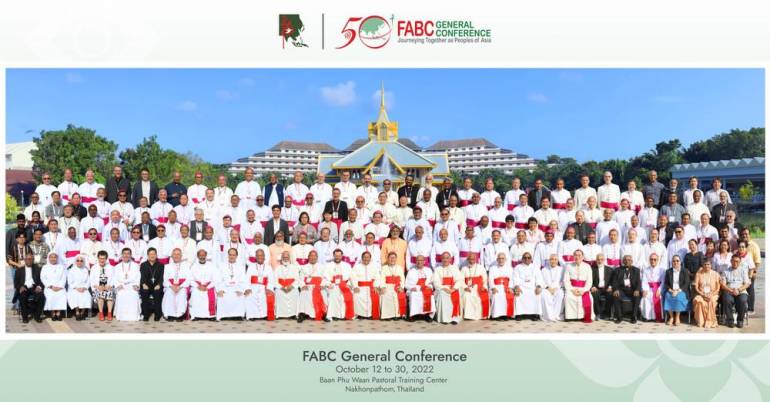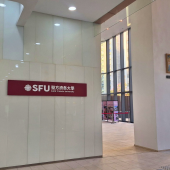FABC Recognizes emerging challenges, need for secular expertise to face them | Part 2

The Federation of Asian Bishops Conference (FABC) saw at its 50th general conference the challenges the Church in Asia faces today and the need for people of expertise to confront them.
The conference's final document, ‘Journeying Together as Peoples of Asia,’ has identified other issues, such as youth, the family, and evolving role of women and interfaith dialogue.
Youth confronting a new world
According to the conference, the youth in the Asia Pacific region today were more prepared than in recent years to take part and reap the benefits from social, economic, and political developments. The youth in the region today were better educated than the previous generations. The gross enrollment rate at the tertiary level rose to 18 percent for male, 15 percent for female.
However, the youth in the region was also facing challenges, the conference revealed.
“Although the present set of youth has numerous advantages and assets, it also faces a complex and rapidly evolving situation where new opportunities coexist with major challenges. Fierce competition is affecting the marketplace in the region. Youth often remain in a vulnerable situation and lack the requisite knowledge and skills to adapt to the changing economic and social environment.”
In Asia, youth comprised 20.8 percent of the labor force in 2004. But unemployment has accounted for nearly half of the jobless in the region at 49.1 percent.
The conference noted long-term unemployment could lead to delinquency, substance abuse, and many more social ills to which the youth have vulnerability. Out-of-school youth are highly prone to drug abuse.
Most of the 1.2 billion youth today live in developing countries, the bishops said. In 2005, about 61.8 percent of the world’s youth lived in the Asia Pacific region.
Gender issues
The prelates have also recognized that LGBTQI+ people are “highly marginalized and face various forms of stigma and discrimination.”
In Georgia, Singapore, and Thailand, gay relationships enjoy some degree of leniency, the conference noted. But in Afghanistan, Brunei, Iran, Qatar, Saudi Arabia, the United Arab Emirates, and Yemen, gay relationships are punishable with death. The LGBTQI+ people in Afghanistan found it even more difficult to live in peace after the Taliban’s takeover in 2021.
“The Economist, through a survey that it conducted in 2019, declared that while 45 percent of the respondents in the Asia Pacific region believed in same-sex marriage is inevitable in the region, 31 percent of the respondents categorically found it unacceptable. Gender issues are indeed contentious matters and so need to be dealt with great sensitivity, discernment, and care.”
The evolving role of women
The conference was also aware of the discrimination, violence, and oppression of women across Asia.
“Their leadership capabilities have been undervalued, their contributions ignored, and some societies still treat women as sub-human.”
The bishops disclosed that they have a number of reports of biases against women involving wage gaps, laws of ownership and inheritance, educational opportunities, abortion, healthcare access, and many more. Gender-based violence still exists and gender issues are largely unacknowledged.
“Asian women are often marginalized in the Church and in society because of the patriarchal mindset of some in the Church and because of the notion of purity and taboos in some Asian religions and certain Southeast Asian cultures.”
The conference has also pointed out that although Church teachings, like the Letter of Pope John Paul II, Mulieris Dignitatim; and Pope Francis’ Post Synodal Exhortation, Christus Vivit, stress the dignity of women, “there is still a big gap between theory and reality.”
“Although women are undoubtedly the majority in the number when it comes to animating a parish, they are not proportionately involved in decision-making in the Church. The internalization of patriarchal values and attitudes by women is also an important factor that impedes the dignity and mission of women in the Church.”
But the conference also observed some improvements. The recent Pew Research Center Survey saw women in Asia have come a long way in getting their voice heard and recognized. They also have taken roles and responsibilities that were traditionally of men.
Family, the bedrock of society
The family is an integral part of society and is the place where values and virtues are first taught, the bishops stated. Asians regard peaceful family life as a blessing.
Pope St. John Paul II once said, the family is “the normal place where the young grow to personal and social maturity” and “the bearer of the heritage of humanity itself.”
“However, families in Asia are currently facing many challenges that threaten their tranquility, stability and unity. Death due to human tragedies, violence, wars, and natural disasters deprives some children of one or both parents.”
Family members were also separated from one another by migration to seek greener pasture abroad. Fortunately, the relatives support and look after the children and spouses left by their breadwinner to work abroad.
“In areas with greater access to social media, attitudes towards the family are being adversely affected by cultural globalization. Moreover, government population control policies also greatly impact attitudes towards marriage, childbearing, and childrearing.”
Interreligious dialogue
Many religious beliefs and cultures thrive in Asia, like Hinduism, Buddhism, Jainism and many others, the bishops said. Competition among different churches could always arise. But Christians should not compete with other religions. Christians should be occupied in restoring the Christian faith and spreading the Good News instead.
“The Church and the individual Christians must demonstrate to the world that they have something to offer in terms of values, commitment, beauty, joy, and happiness. Indeed, a comprehensive worldview which can provide viable ethical and moral guidelines to a world paralyzed by value relativism is the need of the hour.”
Read the entirety of the FABC 50 Bangkok Document by clicking the following link: FABC 50 BANGKOK DOCUMENT
Radio Veritas Asia (RVA), a media platform of the Catholic Church, aims to share Christ. RVA started in 1969 as a continental Catholic radio station to serve Asian countries in their respective local language, thus earning the tag “the Voice of Asian Christianity.” Responding to the emerging context, RVA embraced media platforms to connect with the global Asian audience via its 21 language websites and various social media platforms.














